
Will Santa stuff your stocking with Windows Phone?
Two days from now, Black Friday officially kicks off the holiday buying season -- although some retailers are off to an early start. I've been wondering; What about Windows Phone? I recall how last holiday sales season, Verizon cranked up Droid sales with two-for-one deals. Yesterday, I got e-mail from AT&T announcing four days of Windows Phone buy one get one free, or what Stephen Baker, NPD's vice president of industry analysis, calls BOGO. Can the offer, presumably others coming later in the holiday season and Microsoft's aggressive Windows Phone 7 advertising campaign jumpstart sales? I refer to jumpstart in context of new software and devices, like Verizon Droids were last year.
BOGOs, whether the one for free or another for half price, are common during the holidays, along with rebates and other discount incentives. AT&T's promotion starts on Friday and applies to all three Windows Phone 7 handsets it carries: HTC Surround, LG Quantum and Samsung Focus. There also is a free accessory offer. Deal takers must agree to a new two-year contract.

Vudu movies begin streaming to PlayStation 3 consoles today
Sony PlayStation 3 users can now download and stream high definition movies from Wal-Mart's video on demand service Vudu, with an application released in the PlayStation Store today.
Unlike Netflix and Hulu Plus, two streaming content services previously available on the video game console, Vudu is not subscription-based. It is instead a pay-per-view or download-to-own service like the "Movies" section in Sony's own PlayStation Store.
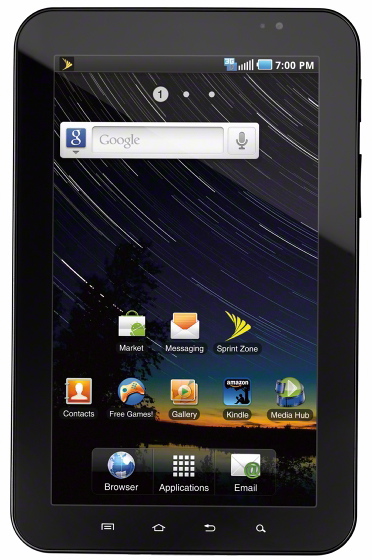
Samsung's Galaxy Tab Sells 600,000 units in first month
Samsung's Galaxy Tab tablet is selling remarkably well globally, according to a report in the Korea Herald. Since its launch last month, the device has sold about 600,000 units across the 30 countries where it is currently available.
While that is nowhere near the million-per-month sales rate of the iPad, Samsung's success in the space shows that there is space for another tablet device to do well. Executives say that they expect to sell about one million Tabs before the end of the year, and the company expects sales to accelerate as the entire market grows in 2011.

Acer announces Android and Windows tablets for 2011
Personal computing giant Acer on Tuesday took the wraps off of three tablet computers it plans to launch in 2011, powered either by Windows 7 or Android.
Since earlier this year, Acer has been rumored to be working on at least two Android-powered tablets for the United States market, and the company today confirmed that it does have Android tablets in the pipleline for an April launch.

FCC's move to modernize 911 with texting, video, begins December
At an event in Arlington, Virginia Tuesday morning, the Federal Communications Commission and Arlington County public safety officials outlined upcoming plans for "Next Generation 911," an update to the United States' 42-year-old national emergency hotline that brings it into the broadband age.
"The current 9-1-1 system is efficient and reliable -- handling more than 650,000 calls a day," FCC Chairman Julius Genachowski said this morning. "Well, 450,000 of those calls are made from mobile phones...Even though mobile phones are the device of choice for most 911 callers, and we primarily use our phones to text, right now, you can't text 911. Let me reiterate that point. If you find yourself in an emergency situation and want to send a text for help, you can pretty much text anyone except a 911 call center."
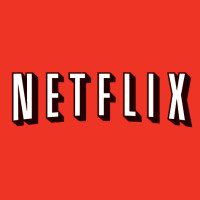
Netflix foretells the future of content distribution with new streaming-only plan
Netflix today announced a revision to its subscription tiers that simultaneously increased the price of its DVD-by-mail plans, and introduced a new bottom-tier plan solely for streaming TV and movies.
Similar to the streaming-only plan Netflix launched in Canada in September, Netflix subscribers will pay $7.99 a month for unlimited access to the Netflix Instant Streaming library. Previously, the cheapest plan cost $8.99 per month and included one-at-a-time DVD rentals as well.
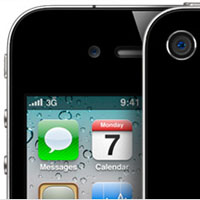
Apple improves iOS entertainment, productivity with 4.2 update
Apple today has rolled out the final version of iOS 4.2 for iPhone, iPod Touch, and iPad. The software update brings more than 100 new features to the mobile operating system, including multitasking, folder organization, AirPlay (the ability to stream content from iOS handhelds to Apple TV,) AirPrint (wi-fi printing,) and free Find My iPhone (geolocation of lost iOS hardware.)
In early September, Apple released iOS 4.1 for iPhone and iPod Touch, an update which brought the mobile operating system some highly anticipated features, such as HDR composite photography, HD video uploading, and Game Center functionality. But this update was quickly overshadowed just a week after that, when the beta version of iOS 4.2 was released, revealing some of the functionality that was made available to the public today.

Forget the gift card, Kindle e-books can now be gifted directly
Amazon today announced that customers can now give Kindle books as gifts to anyone with an e-mail address for consumption on any Kindle app or dedicated e-reader.
In the Kindle Store on Amazon, books have a new button marked "Give as a Gift." When clicked, users are prompted to enter the recipient's email address, and are given the option to include a personal message. The books can be viewed in any Kindle app or device.

I don't believe that 25% of Betanews readers are Linux PC users
Twenty five percent. Well, 25.82 percent to be exact, so closer to 26. That's the number of respondents claiming to be Linux PC users in my poll: "How would you identify yourself as a computer user?" The number is seemingly credible: 2,014 votes from 94 countries -- 988 from the United States. There are 1,858 unique IP addresses, which along with cookies blocking repeat votes suggests the results are largely clean of Linux enthusiasts stuffing the ballot box, so to speak. Something else: After the poll reached the 25 percent Linux PC threshold, it stayed there even as votes accumulated -- that's another indicator the results are good. But I don't believe them, certainly not that only 60 percent of respondents are Windows PC users.
I do believe that Betanews has among its readers very enthusiastic and credible Linux PC users; some of them will share their stories in this post. But the Windows community is much larger, something reflected by other metrics, such as comments or download forums. Additionally, the poll results are unqualified, meaning I don't know who the respondents are. Therefore, I must consider the data to be unreliable.

DARPA funds 100% wireless distributed computing experiment
The Defense Advanced Research Projects Agency (DARPA) is funding a proof-of-concept study at Virginia Tech to create a distributed computing solution that operates in a totally wireless environment and includes multiple computers and handheld devices.
DARPA's interest in distributed computing stretches back more than 40 years, to the beginnings of what we now know as the Internet, when computer resources were scarce.
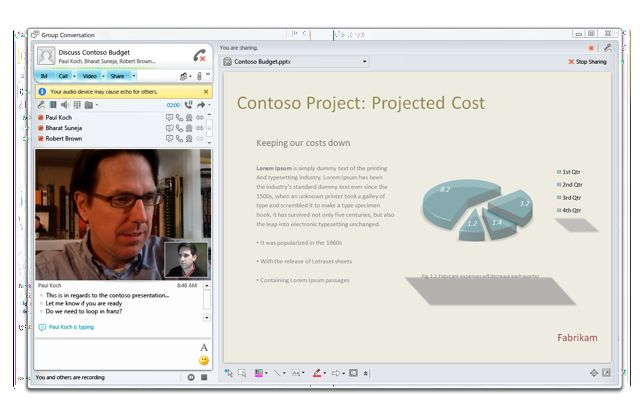
Microsoft's Lync: Unified communications meets Kinect, XBox and iPhone
Formally announced at a New York City press conference, but with a live video pop-in from Microsoft Chairman Bill Gates in Seattle, the latest edition of Lync, Microsoft's unified communications environment will be accessible among huge enterprises, small businesses, and even home-based consumers and gamers.
The actual Lync product unveiled at the rollout, a major update to Microsoft's long-time Office Communications Server (OCS), will run on Microsoft Exchange servers to deliver integrated conferencing services to the predictable desktop PCs, along with specially LCD-outfitted desktop phones, smartphones, laptops equipped with Web clients, and XBox game machines.

MySpace integrates with Facebook, ending social networking wars
In what can be seen as final capitulation to its now much larger rival, MySpace and Facebook announced Thursday afternoon that MySpace would employ Facebook Connect across its site. The change effectively ends what had been a years-long battle for dominance between the two companies.
Called Mashup with Facebook, the partnership means that the recently announced entertainment personalization features would now be powered by publicly available information from the user's profile. Users will also be able to connect their status updates together, allowing Facebook statuses to show up on MySpace.
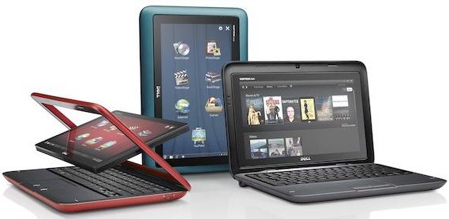
Dell Inspiron Duo, a first-of-its-kind netbook/tablet goes up for pre-order
At the grand opening of the Microsoft Store in Bellvue Square Thursday, Dell began accepting pre-orders for the Inspiron Duo, a convertible Windows tablet PC that takes a completely new approach to the form factor.
Though there have been a handful of different designs for convertible tablet PCs over the last decade, the design most manufacturers have settled upon involves a rotating joint where the screen meets the chassis. Dell's Inspiron Duo, first debuted at IDF earlier this year, mounts the touchscreen on a bezel so that it can be flipped on its horizontal axis like a spinning target in pinball. When facing one direction, the Duo is a touchable netbook, when facing the other, it's a multi-touch tablet.

Sweden wants Wikileaks' founder Assange detained for rape charges
Julian Assange may have so far been able to escape any kind of serious prosecution for his disclosure of secret government documents, but accusations of rape have prompted a Swedish court to approve an arrest warrant for the Australian-born publisher.
Charges against Assange were initially dropped back in August, although two women involved in the accusations appealed that decision. The case was reopened in September, however Swedish authorities have yet been able to locate Assange to question him on the allegations.

Twitter faces growing international competition from Windows Live
At GSMA Mobile Asia Congress yesterday, Sina Mobile general manager Gaofei Wang said his company's 15-month old microblog Weibo is well on track to hit the 100 million user mark by the second quarter of 2011. The Twitter-like service launched in August 2009, and recently hit the 50 million registered user mark. It took popular microblog Twitter a little more than three years to hit the same milestone.
One week ago, Microsoft's Web services branch MSN announced it had partnered with Sina.com to team up and offer a comprehensive web services package to Chinese users.



